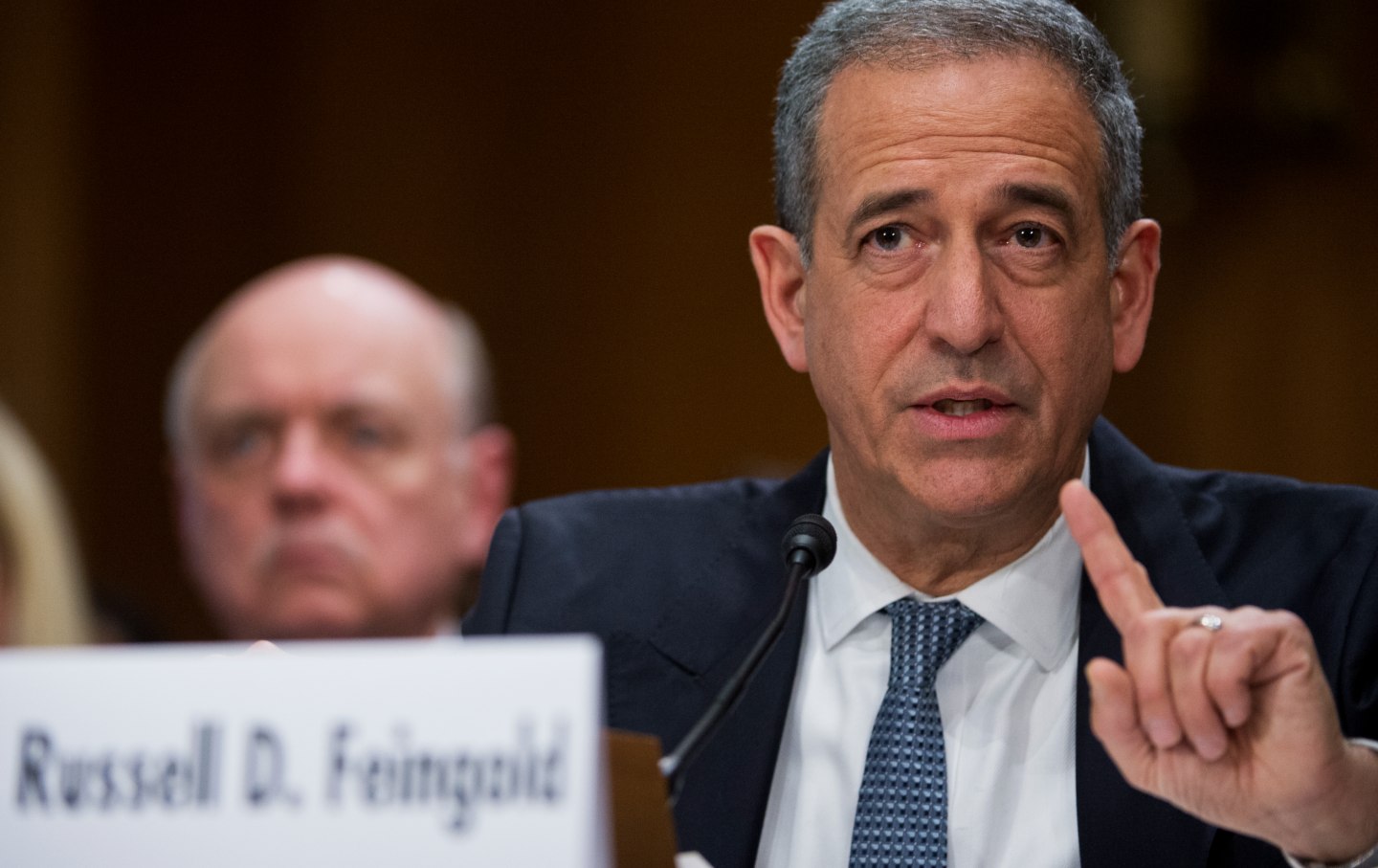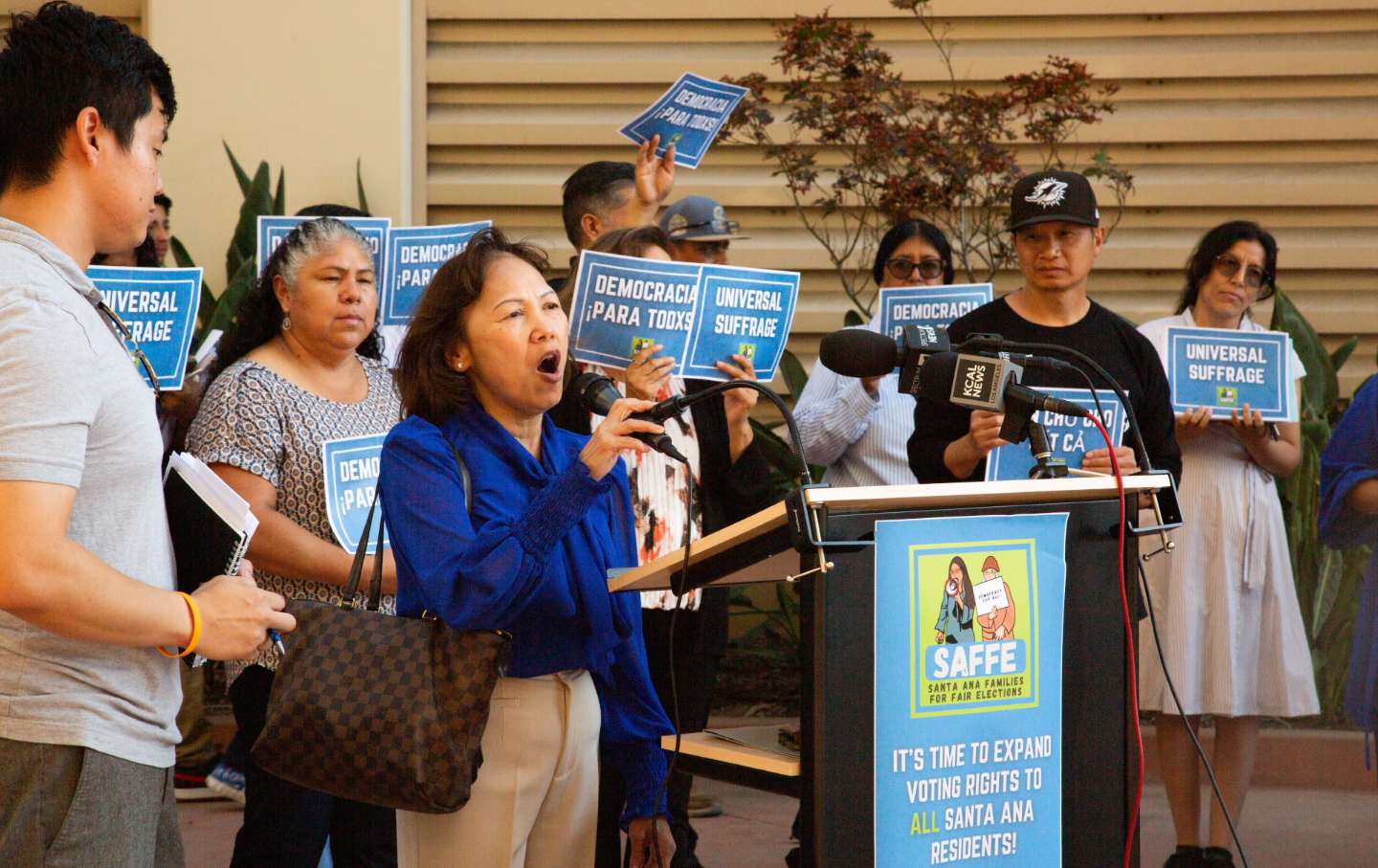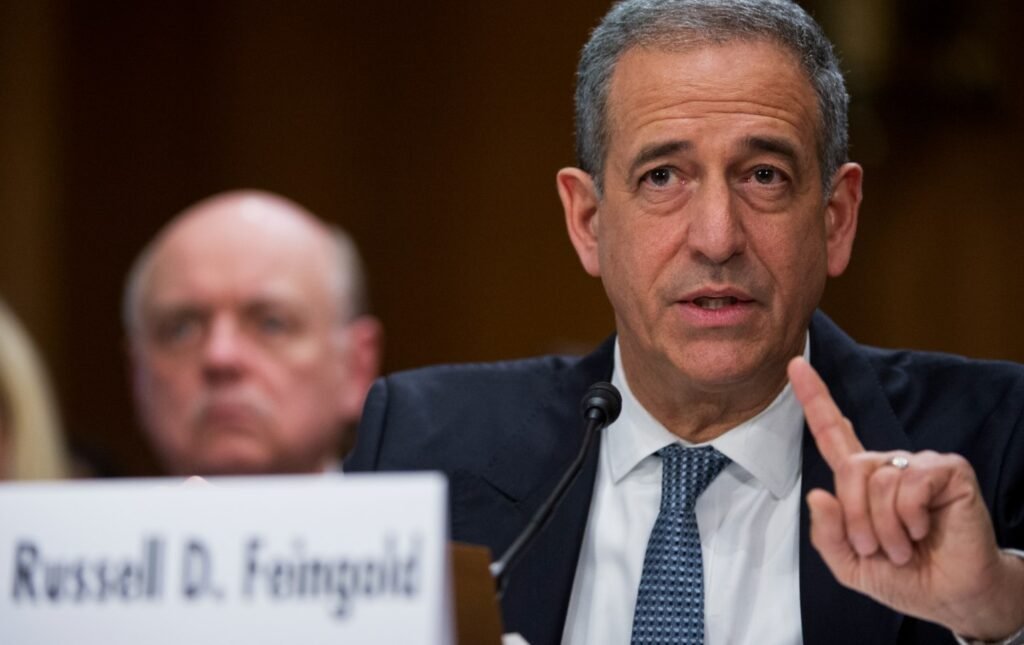The head of the American Constitution Society says President Biden is right: the ratification standard has been met.

Former Sen. (D-WI) Russ Feingold testifies before a 2014 Senate Foreign Relations Committee hearing.
(Tom Williams/CQ Roll Call via Getty Images)
Few elected leaders in American history have been as committed to the US Constitution as Russ Feingold.
During his three terms as a Democratic senator from Wisconsin, Feingold, a Rhodes Scholar and Harvard Law graduate, served as chairman and ranking member of the Senate Judiciary Committee’s Constitution Subcommittee, earning praise from Democrats and Republicans, liberals and conservatives alike for his willingness to put forward constitutional principles partisan politics. After retiring from the Senate in 2011 and teaching at some of the nation’s top law schools, Feingold was elected in 2020 as president of the American Constitution Society. Former Dean of the Yale Law School, Harold H. Co welcomed choice, describing the former senator as “a courageous and brilliant leader who has devoted his entire distinguished career to upholding the Constitution.”
So it was important when Feingold and Harvard Law School professor Lawrence Tribe started arguing three years ago that the Equal Rights Amendment, championed for a century as an important vehicle for advancing the cause of gender equality in the United States, met all constitutional requirements for ratification. Feingold and Tribe argued that no further action by Congress or the executive branch was required for the National Archivist to certify the amendment as what the former senator and ACS believed should be understood as “an already ratified amendment to the US Constitution.”
The views expressed by Feingold and Tribe, as well as other constitutional scholars, have been expanded upon in subsequent years. They gained traction among members of Congress. Now they have been echoed by Joe Biden in one of his last official acts as president.
With days remaining in his term, Biden accepted arguments made by gender equality advocates — including Feingold, with whom Biden served 18 years in the Senate, most of that time when both were members of the Judiciary Committee — that the standard for ratification had been met. On Friday, Biden announced that he believes the ERA is “the law of the land.”
Feingold says Biden’s statement represents a recognition of “the validity of the Equal Rights Amendment that so many have fought so long and so hard for.” But that justice is still denied by many in positions of power, meaning the uphill battle continues — especially now that Biden is out of office and right-wing Republicans control the White House and Congress.
The author National Women’s Party co-founders Alice Paul and Crystal Eastman after women gained the right to vote with the 19th Amendment, the ERA was first introduced in Congress in 1923. His declaration that “Equality of rights under the law shall not be denied or abridged by the United States or by any state on account of sex” was not to be disputed. But it didn’t happen approved Congress until 1972, and the initial push for ratification after congressional action in three states fell short of the 38 needed to add to the Constitution. After an arbitrary deadline for ratification of the amendment passed in 1979 and a second deadline that passed in 1982, decades passed before states began to revisit the issue.
When the legislatures of Nevada (2017), Illinois (2018), and Virginia (2020) finally ratified the amendment, controversy raged over whether it could be certified by the National Archivist. Questions arose as to whether the ratification clock had stopped in 1982, rendering later ratifications irrelevant. While groups such as the National Organization for Women and the ERA Coalition have argued that the ERA has 38 required ratifications, the archivist preferred not to act.
Feingold and Tribe issued a clear statement in 2022 that sought to clarify the issue, shared with the archivist by former House Oversight and Reform Committee Chairwoman Carolyn Maloney, a New York Democrat who has been a key advocate of the ERA in Congress for years. . in it, Tribe wrote“My conclusion as a constitutional scholar is that the ERA is now a valid part of the United States Constitution, that Congress must act concurrently to recognize it as such, and that even if Congress does not act, the Archivist must publish it as The Twenty-Eighth Amendment.”
In the same submission, Feingold wrote“I believe that the ERA meets all constitutional requirements, and the Archivist can and should without delay certify and publish the ERA as the 28th Amendment to the Constitution.” He categorically rejected the idea that further action by the legislature or the executive was necessary. “Congress, by passing the ERA with a two-thirds vote in both houses and sending the proposed amendment to the states for ratification, has fulfilled its constitutional role,” he explained. “The archivist may publish without further action by the executive branch or Congress.”
The archivist did not decide to act.
But the influential American Bar Association heeded calls to action coming from Feingold and the ACS, the American Association of University Women, NOW, the ERA Coalition, the Young Feminists Party, and growing number of members of Congress.
At the ABA annual meeting last summer, it was it’s decided that “the American Bar Association upholds the principle that any delay in ratifying an amendment to the United States Constitution is inconsistent with Article V of the Constitution,” that “Article V does not permit a state to revoke the ratification of an amendment to the Constitution,” and that “federal, state, local, territorial and tribal (should) support the implementation of the Equal Rights Amendment to the Constitution.”
ABA report in the resolution rejected arguments against the deadline by anti-EU forces for blocking the addition of the constitutional amendment. It included a detailed explanation of the fact that “Article V places no time limit on the ratification process” and noted: “Opponents of the ERA concede that the text of the Constitution provides no time limit for state ratification of a constitutional amendment. .” The report relied on Feingold’s March 21, 2022, letter to the House Oversight and Reforms Committee, which stated: “(The discretionary decision order) has not been ratified by the states. If we look at the amendment itself, there’s the introductory wording, and then it says “Article,” and there’s sections 1, 2, and 3. That’s what the states ratified, not the deadline.”
The ABA resolution was approved just five months before the end of Biden’s presidency. During those months, ERA supporters intensified their advocacy, with groups such as the Young Feminists Party organizing demonstrations outside the White House. On the Friday before he left office, Biden said that he agreed with constitutional scholars “that the Equal Rights Amendment has become a part of our Constitution” and said: “According to my oath and duty to the Constitution and the country, I affirm what I believe and what three-fourths of the states have ratified : The 28th Amendment is the law of the land, guaranteeing all Americans equal rights and protection under the law regardless of their sex.”
popular
“Swipe to the bottom left to see more authors”Swipe →
The archivist’s office still refused to act, announcing last Friday that “the underlying legal and procedural issues have not changed.” In response, activists held a rally at the National Archives, p Zakia Thomaspresident of the ERA Coalition of more than 300 organizations that support the amendment, saying, “Do your job. The president did his thing.”
Now that Donald Trump has reclaimed the presidency, Thomas and her allies are seeking to assert what she calls “this fundamental right.”
U.S. Rep. Ayanna Pressley, D-Mass., who co-chairs the Congressional Caucus on the Equal Rights Amendment, is working to get the House to “repeal the arbitrary deadline that has delayed enshrining the Equal Rights Amendment as the 28th Amendment to the Constitution of the United States. After Biden’s action, Presley said she would “continue to fight to ensure that the ERA fully fulfills its promises to all who call America home.”
This job will not be easy given the current Republican control of Washington. But there is work to be done in favor of what Feingold and the American Constitution Society claim is an “already ratified” amendment.
As academics and activists wage this fight, they can lean on Feingold’s response to Biden’s statement. “The ACS and I have long believed and argued, along with many other organizations and women’s rights advocates, that the ERA meets all the constitutional requirements to be recognized as a ratified 28th Amendment to the Constitution already in force,” said the former senator. “As women face increasing threats to their reproductive and bodily autonomy, recognizing—and enforcing—the ERA is more important than ever. This is very important to eliminate the main failure of our Constitution – its silence on gender equality. Thirty-eight states recognized this founding failure and ratified the ERA under the procedure provided for in Article V. It is part of the Constitution and should be treated as such.”
More from Nation

Measures that allowed local noncitizens to vote failed in the last election, but that hasn’t always been the case throughout American history.

Opposite Trump stood a handful of CEOs whose combined wealth exceeded $1.2 trillion. They and the crypto fraudsters are the real beneficiaries of Trump’s second term.





